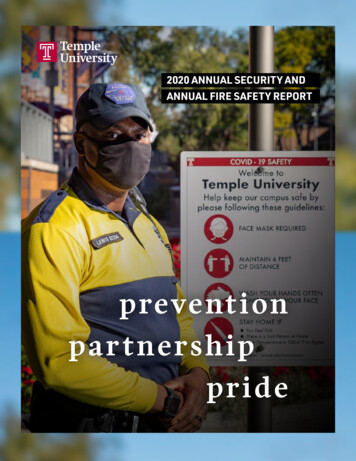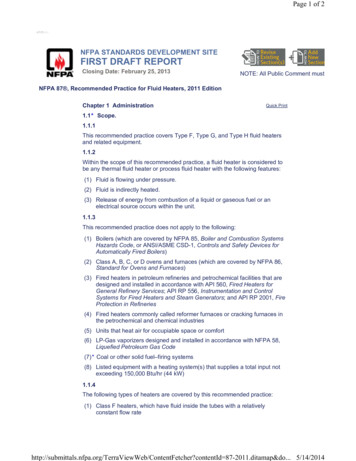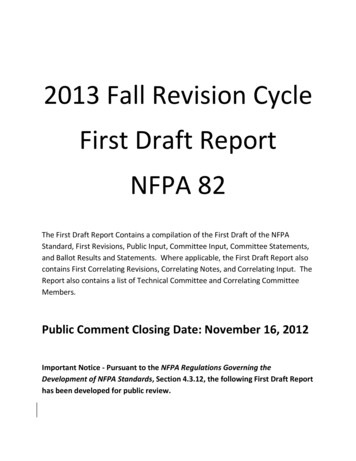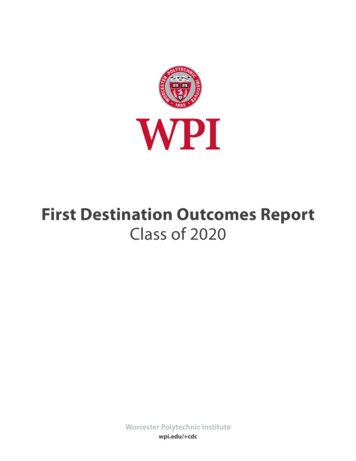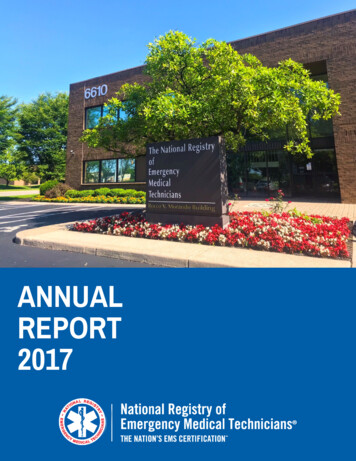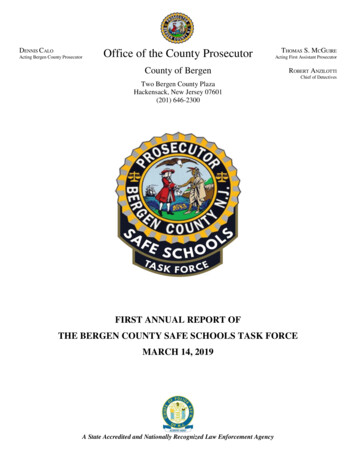
Transcription
DENNIS CALOActing Bergen County ProsecutorOffice of the County ProsecutorCounty of BergenTHOMAS S. MCGUIREActing First Assistant ProsecutorROBERT ANZILOTTIChief of DetectivesTwo Bergen County PlazaHackensack, New Jersey 07601(201) 646-2300FIRST ANNUAL REPORT OFTHE BERGEN COUNTY SAFE SCHOOLS TASK FORCEMARCH 14, 2019A State Accredited and Nationally Recognized Law Enforcement Agency
BERGEN COUNTY SAFE SCHOOLS TASK FORCECHAIRMENActing Bergen County Prosecutor Dennis CaloBergen County Executive James J. Tedesco, IIIEXECUTIVE DIRECTORSupervising Senior Assistant Prosecutor Martin DelaneyTASK FORCE COORDINATORSBCPO Chief of Detectives Robert AnzilottiBergen County Sheriff Anthony CuretonSection Chief Assistant Prosecutor Elizabeth RebeinMENTAL HEALTH COMMITTEECEO CarePlus New Jersey Joseph A. Masciandaro, M.A.Vice President CarePlus New Jersey Amie Del Sordo, LCSWPRIVATE SECTOR COMMITTEEPresident Cerberus Capital Management Matthew E. ZamesBCPO Chief of Detectives Robert AnzilottiSupervising Senior Assistant Prosecutor Martin DelaneyLEGISLATIVE & POLICY COMMITTEEBergen County Freeholder Mary J. AmorosoBergen County Counsel Julien X. NealsBergen County Resilience Officer Raymond A. GuidettiACCREDITATION COMMITTEEBCPO Risk Mitigation Planner William StalloneHarrington Park School Superintendent Adam D. Fried, Ed.D.School Safety and Security Specialist Jonathan D. Miller, M.Sc.TRAINING COMMITTEEBCPO Captain Gary BoeschFair Lawn Police Chief Glen CauwelsPark Ridge Police Chief Joseph J. MaddenRutherford Police Chief John R. RussoSaddle River Police Lieutenant Timothy P. GerityRutherford Police Sergeant Thomas LewisPage 2 of 24
INTRODUCTIONIn our state and across our nation, school safety has been deservedly pushed to the forefrontof public debate and concern following the many unspeakable tragedies within several schoolsaround the country in recent years. In our continuing response to combat potential threats to ourschools here in Bergen County, in April 2018, the Bergen County Prosecutor’s Office (“BCPO”)in cooperation with the Bergen County Executive and Bergen County Board of ChosenFreeholders formed the Bergen County Safe Schools Task Force (“SSTF”). The concept of theSSTF is to bring together under one umbrella various groups or stakeholders that have beendiligently working toward the goal of making our schools safe. These include law enforcement,county government, mental health professionals, school administrators, and private individualswith an interest in school safety. This umbrella concept is particularly urgent given the recent andcontinuing mass shootings in schools, houses of worship, at entertainment events, and othergatherings. Not surprisingly, the SSTF, through the critical review of its working committees,has found the issue of school safety to be a complex task that requires the ongoing efforts of allinterested stakeholders. No one group or stakeholder alone can eradicate violence in schools, butworking together we can minimize the types of risk to our schools that have become inherent tomodern society. The SSTF remains committed to this mission of fostering and ensuring schoolsafety and is pleased to issue this first annual report. It is our sincere hope that the SSTF will, inthe years to come, offer our school districts the highest level of technical assistance and trainingin school safety. Initially, the SSTF will focus its energies on public school grades K through 12.Later, it will expand its efforts to private schools. However, the findings and recommendations ofthis report are applicable to all schools.A copy of this report may be obtained online at www.bcpo.net and in printed form at theadministration office of the Bergen County Prosecutor located at Two Bergen County Plaza,Hackensack, New Jersey.BACKGROUNDThe BCPO, all of Bergen County Law Enforcement, and Bergen County Government placethe highest priority on the safety of our children, our schools, and school personnel. The BCPOhas been at the forefront of the effort to ensure school safety. In 2013, the BCPO launched aSchool Security Initiative comprised of officers from various municipal police agencies. As partof the initiative, the BCPO sponsored training by Texas A&M Engineering Extension Service,Page 3 of 24
which certified 56 police officers and 41 school security professionals in conducting risk andvulnerability school assessments. An additional training is scheduled for April 2019. The BCPORisk Mitigation Planner and municipal law enforcement partners have to date performed securityassessments of 165 public schools and 56 private schools. The BCPO has also partnered withBergen County municipal law enforcement agencies, the New Jersey Department of Education,and the New Jersey State Police in conducting unannounced lockdown drill visits to monitor andprovide technical assistance to schools to enhance their safety procedures.In 2015, the Bergen County Prosecutor tasked the Bergen County Regional SWAT Team(“RST”) with reviewing and revising Bergen County law enforcement procedures and tactics forresponding to active shooter incidents. The RST review included a study of the most recent activeshooter response protocols implemented by major police departments, including those of the NewYork and Los Angeles Police Departments.During its review, the RST contracted withTomahawk Strategic Solutions (“Tomahawk”) of Nashville, Tennessee, a nationally-recognizedsecurity firm whose personnel include current and former United States military tier one SpecialForces operators, corporate security experts, and current and retired law enforcement officers. TheRST review led to enhanced procedures and tactics for responding to active shooter incidents.Following the review, the Prosecutor issued a directive mandating that all Bergen Countylaw enforcement officers receive training in the new active shooter policies and protocols. TheProsecutor also ordered annual refresher training. Training all police officers in the new activeshooter response protocols ensures a uniform and coordinated response by all police officers toactive shooter incidents.In 2017, the Prosecutor and Sheriff instituted the RST Mobile Patrol Initiative. RSTmarked police units, which patrol throughout Bergen County, are staffed by specially trained andequipped SWAT personnel who can rapidly respond to any critical incident, such as an activeshooter call. One of the lessons learned from recent school shootings is the need to reduce tacticalteam response times. In Bergen County, having SWAT team members with specialized equipmentalready on the road accomplishes just that – putting a SWAT response on scene within minutes.Additionally, these patrols act as a force multiplier to Bergen County’s municipal policeagencies. It is Bergen County law enforcement policy to have routine police presence at or nearschools throughout the day. The RST mobile patrols supplement these municipal efforts byPage 4 of 24
conducting routine interior and exterior school security checks. Through these routine butunannounced patrols, the RST and municipal police serve as a deterrent to illegal behavior.The RST and local police also began active shooter protocol training in our schools. Thebenefit of this in-school training is twofold; it provides both familiarity with tactics as well asfamiliarity with the schools.In what at first was a controversial decision, but one which hasultimately proved extremely beneficial, the RST invites some school personnel to observe selectedtrainings. The concept is to promote overall safety by allowing school personnel to know exactlywhat the police response will look like and how they should respond.Additionally, it reinforcesthe training school personnel receive by explaining the reasons underlying the actions they aredirected to take during an active shooter emergency. School personnel may now understand howtheir safety plan works in conjunction with the law enforcement response, thereby emphasizingthe importance of following their school safety plan.Moreover, working directly with school personnel allows the RST to evaluate the overalleffectiveness of the police response as it relates to a school’s specific safety plan. Such evaluationprovides an opportunity to address specific areas of concern directly with school officials to ensurethe safest and most effective response.In 2017, the BCPO established the Bergen County Association of School SecurityProfessionals, comprised of approximately 80 members including school security personnel,district superintendents, business administrators, and buildings and grounds directors. TheAssociation meets regularly to network and share security challenges and best practices, as wellas to develop strategies to enhance school security.In 2018, the BCPO established a Threat Management Unit staffed by CounterterrorismCoordinators and other detectives within its Intelligence and Counterterrorism Unit. ImplementingAttorney General Guidelines, the BCPO directed all Bergen County law enforcement agencies toimmediately report any threat-based activity indicating a serious potential act of violence to theThreat Management Unit for investigation and response.The BCPO also issued directives requiring Bergen County law enforcement to immediatelynotify the Threat Management Unit of all information related to threats of serious physical violenceby individuals suffering from mental illness, for investigation and response.Page 5 of 24
TASK FORCE COMMITTEESFollowing the formation of the SSTF in April 2018, the SSTF set up committees to focuson and leverage the members’ unique talents, experiences, and perspectives in five core areas:mental health, private sector, legislative and policy, accreditation, and training. The goal of thesespecialized committees was to not only recommend school security best practices, but also toidentify failure points in their specific areas that threaten school safety.Finally, the SSTF was tasked with educating school professionals through both this reportand a series of trainings. We envision the SSTF as an on-going endeavor; one through which theTask Force will continually evaluate the planning and response to the challenges of making BergenCounty’s schools as safe as they can possibly be. In June 2018, the SSTF committees began workin earnest toward establishing individual goals and the means to achieve them. The committeeswere encouraged to review the work of other such committees and task forces. The following is asummary of each specialized committee and its recommendations.Mental Health CommitteeMental illness and emotional and psychological disruption are the background for manyactive shooter incidents.Identifying and treating students suffering from these conditionspromotes school safety. The SSTF formed the Mental Health Committee to recommend ways topromote early intervention for mental health needs in schools in a proactive approach to identifybehaviors that threaten school safety.Mental Health TrainingThe Mental Health Committee’s immediate focus was on training school personnel on therelevant early warning signs and risk factors of emotional and psychological disruption in students.Schools can then identify students at risk in order to provide them with the most clinicallyappropriate interventions. The Mental Health Committee worked hand-in-hand with the TrainingCommittee to develop the Mental Health in Schools Training Module. This training educatesschool personnel to assess issues of concern in an effort to prevent violent behavior.Mental Health Assessment Care Team (“ACT”)As part of its efforts, the Mental Health Committee will also instruct school administrators on theimportance of establishing an Assessment Care Team (“ACT”). The Mental Health Committee’sACT recommendation is based on work in this area conducted by the FBI and Secret Service, theVirginia Student Threat Assessment Guidelines, and its own experiences and research. ThePage 6 of 24
Committee suggests that a formal ACT for each school will provide for more efficient interventionand treatment for students experiencing mental health issues.The Committee recommends that a school’s ACT include a Team Leader (e.g., principal,vice principal), a mental health professional (e.g., school social worker, psychologist, psychiatrist)and a trained school safety personnel (e.g., Special Law Enforcement Officer III (“SLEOIII”),School Resource Officer (“SRO”), Security Officer).This will ensure multiple relevantviewpoints and inputs for decision making.The Mental Health Committee also suggests the use of a School Threat AssessmentDecision Tree to aid Mental Health Teams in their assessments of student conduct and mentalhealth and emotional issues, to distinguish student behaviors that do not present the risk of violentbehavior from those who do present such risks, and to make proper recommendations and referralsto address students’ mental health needs.The Mental Health Committee’s assessment tools and recommendations are fully presentedin its Mental Health in Schools Training Module, which is highly recommended for all schoolprofessionals.Private Sector CommitteeThe Private Sector Committee was formed to investigate how private industry can assistschools in their safety planning. Special emphasis was placed on leveraging technology to advancethe school safety mission, as well as the private sector’s ability to assist schools in policy creationand personnel training.Private Security Service ProvidersThe Private Sector Committee immediately recognized that school safety begins withpolicy and facility-specific security plans and training; but a safety plan is worthless if it is neitherwell known nor readily implemented by the people who must execute it. It is therefore critical thatall school personnel be properly trained in both the policy and plan. Moreover, the most effectivesafety plan is one that integrates with the police response – not in theory but in actual practice.The SSTF recognizes that one size does not fit all when it comes to security policy,planning, and training. Therefore, it is the responsibility of individual school districts to determinewhat services, if any, they need from private security service providers. To assist schoolsuperintendents and administrators in this area, the BCPO has contracted with Tomahawk StrategicSolutions, which has trained Bergen County law enforcement in policies and tactics for respondingPage 7 of 24
to active shooter events, to provide a comprehensive, one-day training on school security that willcover everything from policy drafting to traumatic casualty care. Each individual district canthereafter decide what training is appropriate for itself. The Tomahawk training will be held onApril 26, 2019.LiveSafe Security ApplicationAdditionally, the ability to easily and effectively communicate is essential to all aspects ofschool safety and active shooter response. From reporting suspicious behavior to providing realtime actionable intelligence during an event, communication is key. Accordingly, the PrivateSector Committee focused on technology that delivered all of the communication essentials in asingle, user-friendly platform. After much searching, the Committee chose the LiveSafe platform.LiveSafe is a cellular-based tip reporting and two-way communication application that functionsas a risk mitigation tool.1Through LiveSafe students, teachers, parents, and all school personnel can report tips andsuspicious behaviors, anonymously if desired. The tips are categorized into a number of areassuch as facility security, threatening behavior, and suspicious activity. Tips can then be directedto school officials, law enforcement, or both, providing critical information to those who need itmost. Moreover, LiveSafe reduces barriers to communication that typically prevent the sharing ofsuch vital information. LiveSafe is a simple and user friendly platform targeted to our BergenCounty student population – those most likely to have crucial information needed to prevent schoolviolence. Unfortunately, history demonstrates that students are often reluctant to share theirinformation for a number of reasons, including lack of anonymity and uncertainty about how toreport. LiveSafe eliminates student reluctance by providing an effective and anonymous way toshare their information. Additionally, information is not limited to threats of serious violence.LiveSafe can be an effective tool for reporting acts of bullying, illegal drug use or activity, orstudents in need of intervention and counselling. LiveSafe will be available for implementation inSeptember 2019.During a lockdown event, LiveSafe can also be used as a two-way communication device,allowing school administrators and police officials to provide critical and real-time information toteachers and students inside a school. Conversely, those under lockdown can flow information1More information can be found at https://www.livesafemobile.com/.Page 8 of 24
out to responding emergency personnel. This type of communication is essential to an effectiveresponse.The BCPO has deemed LiveSafe so essential to Bergen County’s school safety missionthat it has directly contracted with LiveSafe to provide the application to all Bergen County schoolsand government offices at no cost to them. The BCPO will pay all start-up costs to provideLiveSafe county-wide. However, LiveSafe will only be effective if it is widely used. Therefore,we urge all school administrators to ensure that all employees and students download LiveSafe andtrain on its use and functions.Collaborative Response GraphicsThe coordination of emergency personnel to violent school incidents and the identificationof target areas are critical to an effective response. Collaborative Response Graphics (“CRGs”)2are simple visual communication and collaboration tools – useable under stress – by everyoneinvolved in an incident to coordinate emergency response both outside and inside a structure.CRG technology creates digital grid-maps of both the exterior and interior of schools (orany structure). These grid maps are accessed by first responders via a cellphone application. Thisallows first responders using their cellphones to quickly identify specific and important areas of astructure such as entry points, shooter location, and casualty collection points. This quick andeffective means of communication focuses all available assets on an effective response. It alsoreduces delay in determining and finding important locations. CRG saves precious minutes andseconds, which may save lives. This technology is particularly important in Bergen County, wherethere are 72 police agencies and great reliance on surrounding police departments for mutual aid.These officers may not be familiar with a neighboring school’s layout. With CRG, that lack offamiliarity will not negatively impact the effectiveness of their response.Beyond first responders, CRG is also available for use by school administrators andemployees. Each school administrator can assign and manage the availability of the system to itsemployees through a series of permissions it defines and grants. This allows school administratorsthe ability to track and account for their employees and missing students.2For more information visit https://www.crgplans.com/.Page 9 of 24
The primary cost for CRG has been borne by the BCPO and federal grant funds.3 Thisexpenditure, including personnel costs, administration of the system, training for law enforcement,and computer server costs, will not be passed on to our schools. The only cost to be covered by aschool is the mapping itself – typically around 2,500 per school. Such mapping can thereafter beintegrated into a school’s digital safety plan. Moreover, CRG mapping has been pre-approved bythe New Jersey School Insurance Group for purchasing through its annual safety grant program.CRG maps are being used throughout
Hackensack, New Jersey 07601 (201) 646-2300 A State Accredited and Nationally Recognized Law Enforcement Agency . offer our school districts the highest level of technical assistance and training in school safety. Initially, the SSTF will focus its energi


